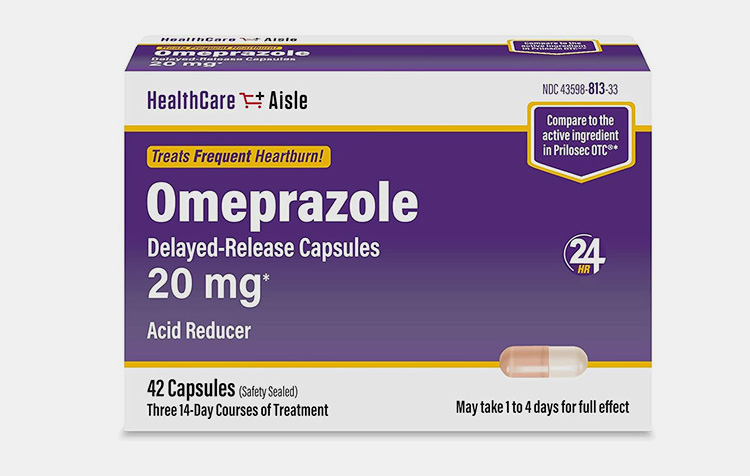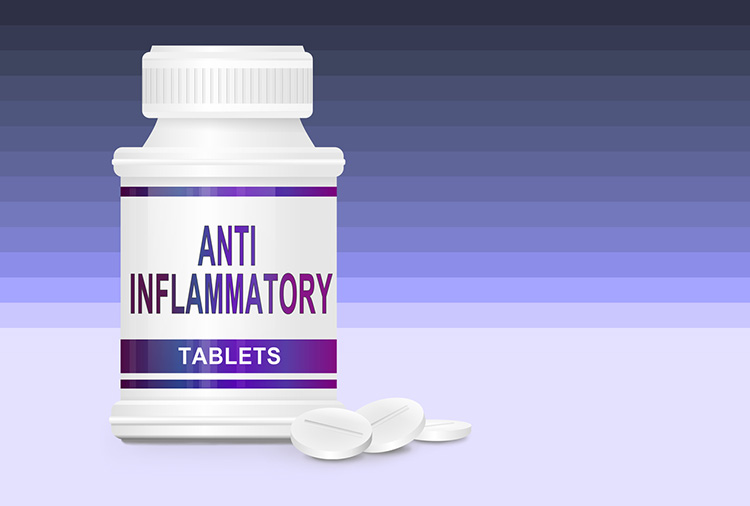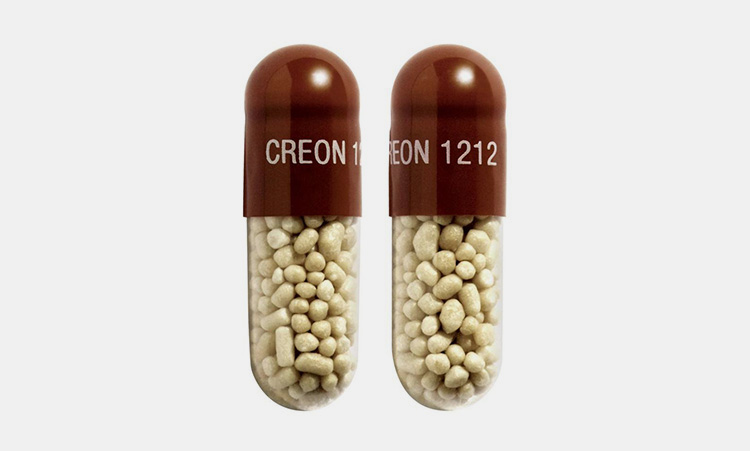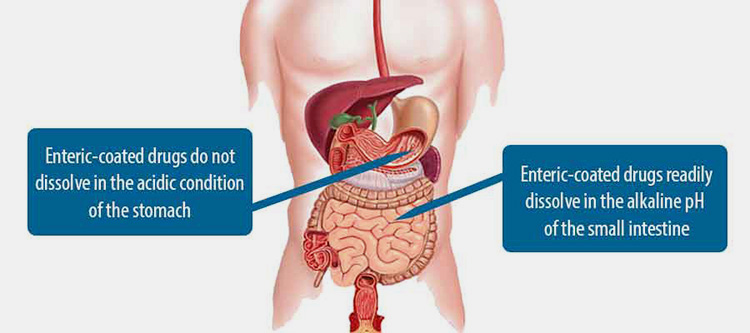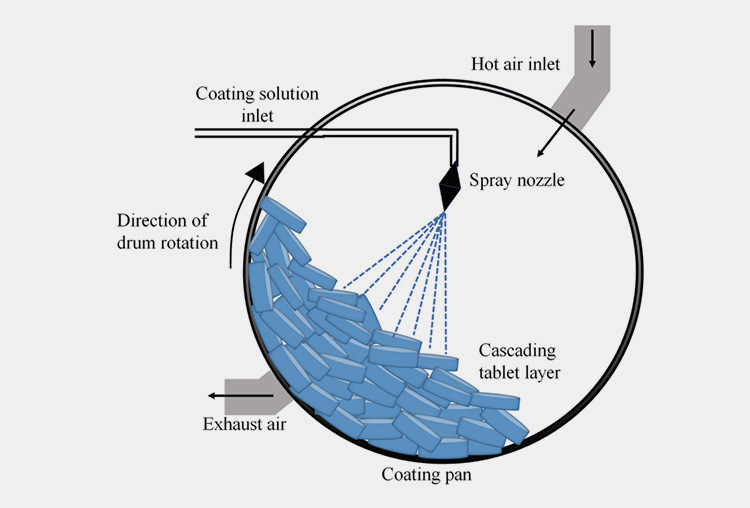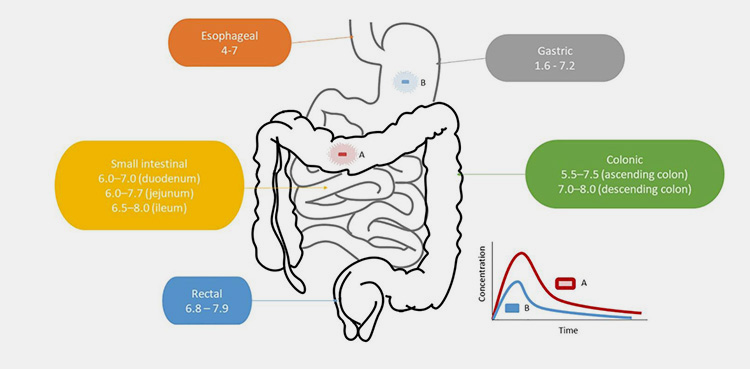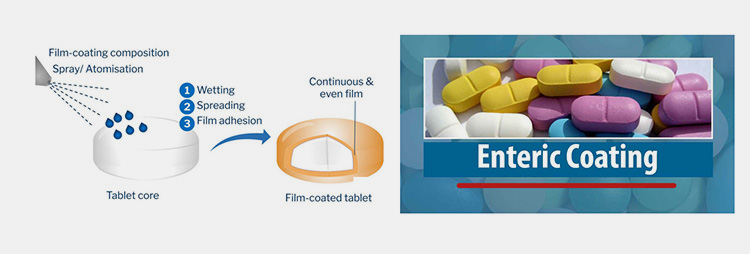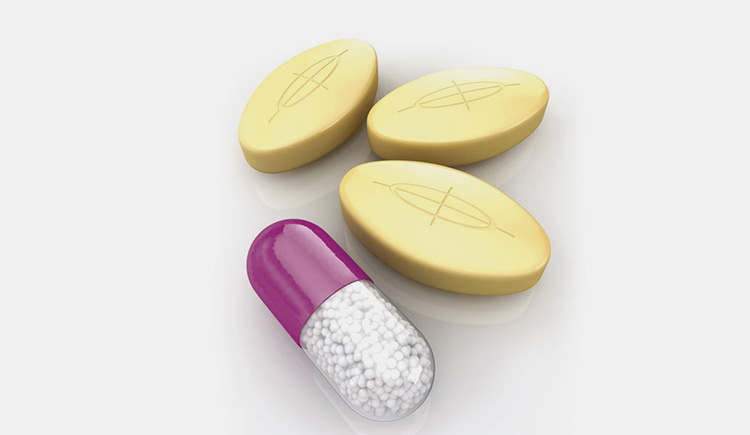What Does Enteric Coated Mean?
Do you know that enteric coated medications are dissolved in alkaline environment like small intestine rather than an acidic environment of stomach? But the question here remains that actually what enteric coated is? Why is it applied on different types of medications? Why such types of medications are to be dissolved in intestine leaving the stomach?
Enteric Coated Fish Oil - Picture Courtesy: Omegavia
Commercially both enteric and film coated medications are manufactured depending upon their usage and application. Both of them have their own advantages. So in this guide we will be explaining in detail about enteric coated and its usage. Read it completely and get the most from it.
1.What Does Enteric Coated Mean?
Enteric Coating Process - Picture Courtesy: iPharmachine
Stomach of a human being contains acidic substances. This acidic environment can cause irritation once specific type of capsule or tablets gets dissolved in it. To prevent this irritation and reaction with acidic environment, enteric coated is applied on pharmaceutical medications so that it remains unaffected in acidic environment and gets dissolved in basic one to get its better results.
Enteric coated is made up of Most of the times medications with enteric coated are dissolved in small intestine polyvinyl acetate phthalate, methacrylic acid copolymers and cellulose acetate phthalate like polymers that helps in blocking the reaction of those
2.What Material Are Used In Applying Enteric Coated?
Depending upon the chemical composition, materials used for enteric coated are as follows
Hydroxypropyl Methylcellulose Phthalate
Hydroxypropyl Methylcellulose Phthalate
The most commonly used polymer for enteric coating is hydroxypropyl methylcellulose phthalate. It is used due to its highly resistive nature against acid and easy solubility. Most of the medications that are taken orally are made up of HPMCP.
Cellulose Acetate Phthalate
Cellulose Acetate Phthalate
Cellulose acetate phthalate is one of the best polymers used for applying enteric coating due to its greater solubility in alkaline environment. Most of the cellulose acetate phthalate is used in medicines that show delay releasing strategy when consumed.
Polyvinyl Acetate Phthalate
Polyvinyl Acetate Phthalate
PVAP is a type of polyvinyl polymer that has same standing property like other enteric coated material. The only disadvantage in a polyvinyl acetate phthalate is that it can be applied on certain types of drugs only.
3.What Types Of Medications Uses Enteric Coated Layer?
Enteric coated are applied on various types of medications that are used for patients well being and proper treatment. Some of the medication on which enteric coated is applied are
Proton Pump Inhibitors
Omeprazole
Most of the proton pump inhibitors are used to response against the gastro esophageal reflux diseases. These require enteric coated to help them show resistance against the acidic environment of stomach and prevents from peptic ulcer condition. Aciphex, omeprazole, protonix and lansoprazole are the common examples of proton pump inhibitors that have enteric coated on their surface.
Antibiotics
Erythromycin - Picture Courtesy: Wellona Pharma
Antibiotics like erythromycin and doxycycline have enteric coated applied on them as they needs to be released in longer duration. If enteric coated is not applied on them then they will be reacted quickly in stomach and can show less effectiveness.
Anti-Inflammatory Drugs
Anti-inflammatory Tablets - Picture Courtesy: National Elf Service
Anti-inflammatory drugs are the ones that are non-steroidal in nature and can cause ulcer if released in acidic stomach. Aspirin or acetylsalicylic acid in the best example of an anti-inflammatory drugs that needs to be dissolved in intestine to reduce the chances of irritation and ulcer.
Pancreatic Medication
Enzymes - Picture Courtesy: Cystic Fibrosis WA
For proper working of pancreas and its pancreatic juices, capsules like pancrelipase have enteric coated layer to protect both throat and mouth from irritation.
Steroids
Budesonide
Budesonide and corticosteroids are some of the steroids that use enteric coated layer to minimize its side effect and prevents diseases like Crohn’s disease.
4.How Can Enteric Coated Protect The Purity Of Medication?
Enteric Coating: An Overview - Picture Courtesy: Phamaappraoch
Some of the modes in which enteric coated protects the nature of a medication are
Prevents Reaction With Gastric Acid
The most important thing for which enteric coated are preferred is that it prevents the medication to react with the gastric acid present in the stomach. As low pH values are present in the stomach, medications with greater chemical properties easily passes through the stomach without any reaction if carries enteric coated. The purity of the medication remains the same once it reaches the alkaline nature.
Allows Mature Release
Enteric coated allows delayed releasing strategy to get better effect of medication in human body. Once the medication reaches its favorable alkaline environment and gets mature duration then it gets releases to get better results.
Drug Releasing Time
Rapid Drug Release - Picture Courtesy: Evonik Health Care
It prevents from quick release of drug and allows enhancing its duration by properly maintaining the efficacy of it. Drug that require greater solubility in body are ideally to be applied with enteric coated.
Prevents Irritation
One of the most unique way to protect the medication is it does not causes any sort of irritation which travelling through the gastro esophageal channel if enteric coated is applied on it. This helps the drug to show maximum results without any side effect.
5.How Is Enteric Coated Applied?
Tablet Enteric Coating - Picture Courtesy: Springer Link
Application of enteric coated is a complete systematic process that is carried on in several uniformly arranged steps. These steps include
Initially the solution for coating is preparing that carries mixture of additives, polymers and some of the plasticizers. This coating solution is prepared in the big tank so that the mixture can be properly mixed.
In the next step, properly mixed coating solution is applied on the drugs. Medications like tablets, capsules or pills are loaded in a rotating drum and the then coating solution is sprayed on them. This process is carries in high care as uniform enteric coated is necessary in each of the drug.
In the third step, these drugs are dried under hot air stream so that the moisture or humid content can be removed from them and pure enteric coated medications can be processed.
Finally, the medications are cured in the last step where they are exposing in high temperature to make them resistive against acidic environment and get better effectiveness.
6.Is Enteric Coated Dangerous With Its Side Effects?
Drug Allergy - Picture Courtesy: Penn Medicine
Most of the enteric coated medications do not have any of the side effects as they are purely used prevent any sort of stomach ulcer or gastro esophageal irritation. The only side effect is related to the human body and its hormonal system. Individuals that are allergic to polymer substances might have potential risk of getting skin problems and some time it might be of severe condition.
Other than that if enteric coated is not applied properly it might react with the stomach acid and cause gastrointestinal irritation and nausea. Finally, few food materials can also react with the enteric coated medication that can cause harmful results so it is always better to consult with physicians before taking such medications.
7.Does Enteric Coated Helps Is Easy Absorption Of Medications In Gastrointestinal Tract?
Enteric Coated Absorption - Picture Courtesy: Science Direct
Enteric coated medications are easy to absorb in the small intestine of a gastrointestinal tract as they support in delay releasing of drug to get bet results. It prevents the body to get degradation from stomach acid acts as a barrier against low pH environment. Small intestine with basic environment easily absorbs this enteric coated medications and it’s less sensitive in nature and can easily help drug to work in an appropriate manner.
8.How Film Coated Medications Are Different From Enteric Coated?
Some of the difference between a film coated and an enteric coated medication are
Chemical Composition
Film coated usually has water soluble polymers or a thin layer of polyvinyl alcohol coated solution applied on medications.
Whereas, enteric coated medication use coating solution that is directly resistive towards acid conditions. Polymers that have low pH resistance like cellulose acetate phthalate, methacrylic acid copolymers and polyvinyl acetate phthalate are used for enteric coated.
Application
Film coated is directly applied on medications that have thin outer later and to provide them a pleasant look and easy swallowing.
Enteric coated is applied to provide protection from the acidic environment of stomach and easy dissolving in intestine.
Release Strategy
Film coated medications are dissolved quickly in the stomach and gives rapid response against the disease.
On the other hand, enteric coated medications are slow in releasing their components as they travel to gastrointestinal tract for easy absorption.
Examples
Most of the medications and drugs available have film coated layer including vitamins and pain killers.
Some unique type of antibiotics, proton pump inhibitors, anti-inflammatory drugs and steroids are the example of medications that have enteric coated layer on their surface.
9.Does Enteric Coated Cause Delay In Administrating Process Lines?
Enteric Coating - Picture Courtesy: CPHI Online
To get the therapeutic effects of any medication, intentional delays are inserted in administrating process lines while performing enteric coated. This delay is primarily inserted so that each single part of the drug can get complete enteric coated and no space should be left so that proper stability and results can be received. Similarly, the delay due to enteric coated inside the body is also to get its optimal results.
Conclusion
Enteric coated is a highly sophisticated way to prevent different types of drugs from acidic reactions. But it is always important to be familiar with what actually enteric coated is and why is it applied on medications? How is this type of coating different from film coating and what their usages are? This what does enteric coated mean gives you complete information related to enteric coated and its applications. If you still required more information regarding enteric coated and different machines involved in its process, you can contact All pack and we will guide you 24/7.
Don't forget to share this post!
CONTACT US
Tell us your raw material and project budget to get quotations within 24 hours.
WhatsApp Us: +86 181 7101 8586
The Buyer's Guide






